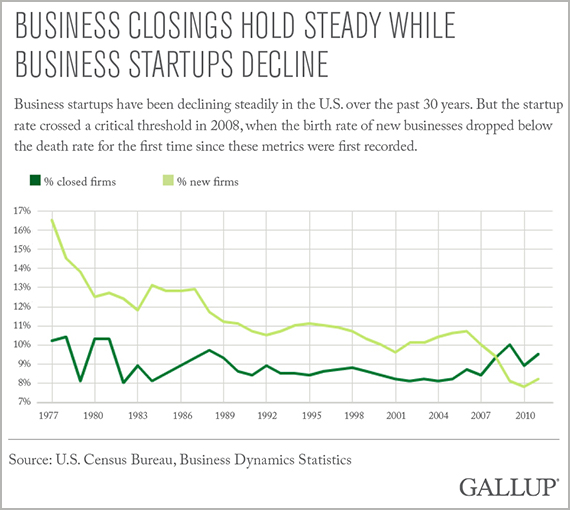The US economy will continue to decline even after the credit bust because it is actively disincentivizing entrepreneurs and driving them out of the country:
The U.S. now ranks not first, not second, not third, but 12th among developed nations in terms of business startup activity. Countries such as Hungary, Denmark, Finland, New Zealand, Sweden, Israel and Italy all have higher startup rates than America does.
We are behind in starting new firms per capita, and this is our single most serious economic problem. Yet it seems like a secret. You never see it mentioned in the media, nor hear from a politician that, for the first time in 35 years, American business deaths now outnumber business births.
Just look at my family. The USA has already have lost over 50 jobs, and based on past taxes paid, more than $100 million in state and federal taxes after jailing my father for 11 years for his failure to pay around $2 million in taxes it claimed he owed. It also lost the benefit of any new businesses he would have started in the last ten years. And it has lost whatever benefit it would have gained from several opportunities in the USA I would have pursued in the past, but instead elected to leave fallow because the regulatory and compliance headaches were too high when piled on top of the usual risks and time commitments involved. I was never as successful as my father, of course, but my business did reach a respectable size and employed a dozen people.
It’s so bad these days that the USA is not only disincentivizing both its resident and expatriate entrepreneurs, but is even causing the latter to give up their citizenships in record numbers. Eduardo Saverin, one of the Facebook co-founders, is far from the only U.S. citizen to renounce his citizenship over tax-related business matters. For years, the American instinct has been to say “good riddance” to such renunciates, but the country is past the point where it can afford to do so, especially when most other countries are very actively courting the small minority of people who are capable of creating new businesses that will provide new job opportunities for their citizens. At this point, foreign entrepreneurs would have to be either stupid or very short-sighted to pursue a green card that will serve as a financial anchor for the rest of their lives.
The tragic thing is that the USA is no longer the land of opportunity for entrepreneurs. It was only 20 years ago that the young guys who started id Software moved from Wisconsin to Texas because the opportunities were better there. But the ids of tomorrow are now leaving the USA for other countries, and are increasingly starting them in places like Eastern Europe, the Nordic countries, and Israel. The last five big game startups have come out of Russia, Finland and Sweden; one of the biggest mobile game successes is in Serbia. This means that even aside from its macroeconomic problems, the USA is very unlikely to possess the long-term potential for growth it once took for granted anymore.
The effects of these negative developments concerning entrepreneurial activity are somewhat obscured by the fact that New York is still the financial capital of the world; four of the six game companies mentioned either went public in the USA or were acquired by US companies. But it doesn’t change the fact that innovation is increasingly taking place outside the USA.
